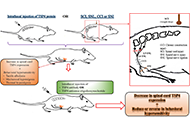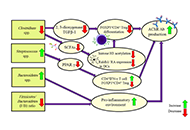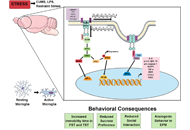Toll-like receptor 4 in the interface between neuroimmune response and behavioral alterations caused by stress
Different stressors can elicit neuroinflammatory responses modulated by innate immunity receptors, such as the family of Toll-like receptors (TLRs). The TLR4, a pattern recognition receptor (PRR), i
[...] Read more.
Different stressors can elicit neuroinflammatory responses modulated by innate immunity receptors, such as the family of Toll-like receptors (TLRs). The TLR4, a pattern recognition receptor (PRR), is involved in many diseases, such as inflammatory and central nervous system (CNS) diseases. Stress exposure can regulate the expression of PRRs, including TLR4, in the brain of animals, especially in the hippocampus and prefrontal cortex. Moreover, TLR4 modulates behavior and neuroinflammatory responses in the brain. In addition, to TLR4, the endocannabinoid (eCB) system plays a role in stress response and immunity, acting as a regulatory, stress-buffer system. This system is involved in many TLRs-mediated immune responses, such as microglia activation. Therefore, pharmacological approaches targeting the eCB system could modulate neuroinflammatory responses to stress by interfering with the TLR4 pathway. Although the connection between TLR4, stress, and neuroinflammation is well documented, almost no pre-clinical studies investigate the possible direct relationship between TLR4, behavior, stress, and the eCB system. Studies exploring the relationship between stress, neuroinflammation, TLR4, and the eCB system were searched using Pubmed, Web of Science, and Embase databases. Based on this search, this review is focused on the involvement of TLR4 receptors and signaling in neuroinflammation and the behavioral consequences of stress exposure. Moreover, evidence of the eCB system modulating TLR4-mediated responses was brought to the attention, pointing out a possible regulatory role of these responses by eCBs in behavior changes related to mood disorders.
Fábio José Coelho Souza-Junior ... Sabrina Francesca Lisboa
Different stressors can elicit neuroinflammatory responses modulated by innate immunity receptors, such as the family of Toll-like receptors (TLRs). The TLR4, a pattern recognition receptor (PRR), is involved in many diseases, such as inflammatory and central nervous system (CNS) diseases. Stress exposure can regulate the expression of PRRs, including TLR4, in the brain of animals, especially in the hippocampus and prefrontal cortex. Moreover, TLR4 modulates behavior and neuroinflammatory responses in the brain. In addition, to TLR4, the endocannabinoid (eCB) system plays a role in stress response and immunity, acting as a regulatory, stress-buffer system. This system is involved in many TLRs-mediated immune responses, such as microglia activation. Therefore, pharmacological approaches targeting the eCB system could modulate neuroinflammatory responses to stress by interfering with the TLR4 pathway. Although the connection between TLR4, stress, and neuroinflammation is well documented, almost no pre-clinical studies investigate the possible direct relationship between TLR4, behavior, stress, and the eCB system. Studies exploring the relationship between stress, neuroinflammation, TLR4, and the eCB system were searched using Pubmed, Web of Science, and Embase databases. Based on this search, this review is focused on the involvement of TLR4 receptors and signaling in neuroinflammation and the behavioral consequences of stress exposure. Moreover, evidence of the eCB system modulating TLR4-mediated responses was brought to the attention, pointing out a possible regulatory role of these responses by eCBs in behavior changes related to mood disorders.
 Blockage of thrombospondin 4 secreted by spinal astrocytes may be a promising therapeutic target in the treatment of neuropathic painOpen AccessReviewNeuropathic pain (NP), which is difficult to treat, remains a heavy burden for both individuals and society. The efficacy of current treatments is insufficient. The pathophysiology of NP is still no [...] Read more.Neslihan Düzenli ... Aytül ÖnalPublished: October 31, 2022 Explor Neuroprot Ther. 2022;2:226–241
Blockage of thrombospondin 4 secreted by spinal astrocytes may be a promising therapeutic target in the treatment of neuropathic painOpen AccessReviewNeuropathic pain (NP), which is difficult to treat, remains a heavy burden for both individuals and society. The efficacy of current treatments is insufficient. The pathophysiology of NP is still no [...] Read more.Neslihan Düzenli ... Aytül ÖnalPublished: October 31, 2022 Explor Neuroprot Ther. 2022;2:226–241 Overview of biomarkers in myasthenia gravisOpen AccessReviewMyasthenia gravis (MG) is a rare auto-immune neuromuscular junction (NMJ) disorder which is caused by formation of autoantibodies and destruction of NMJ components. The MG diagnosis is based on the [...] Read more.Fatemeh Afrashteh, Rayan RajabiPublished: October 31, 2022 Explor Neuroprot Ther. 2022;2:210–225
Overview of biomarkers in myasthenia gravisOpen AccessReviewMyasthenia gravis (MG) is a rare auto-immune neuromuscular junction (NMJ) disorder which is caused by formation of autoantibodies and destruction of NMJ components. The MG diagnosis is based on the [...] Read more.Fatemeh Afrashteh, Rayan RajabiPublished: October 31, 2022 Explor Neuroprot Ther. 2022;2:210–225 Toll-like receptor 4 in the interface between neuroimmune response and behavioral alterations caused by stressOpen AccessReviewDifferent stressors can elicit neuroinflammatory responses modulated by innate immunity receptors, such as the family of Toll-like receptors (TLRs). The TLR4, a pattern recognition receptor (PRR), i [...] Read more.Fábio José Coelho Souza-Junior ... Sabrina Francesca LisboaPublished: October 31, 2022 Explor Neuroprot Ther. 2022;2:182–209
Toll-like receptor 4 in the interface between neuroimmune response and behavioral alterations caused by stressOpen AccessReviewDifferent stressors can elicit neuroinflammatory responses modulated by innate immunity receptors, such as the family of Toll-like receptors (TLRs). The TLR4, a pattern recognition receptor (PRR), i [...] Read more.Fábio José Coelho Souza-Junior ... Sabrina Francesca LisboaPublished: October 31, 2022 Explor Neuroprot Ther. 2022;2:182–209